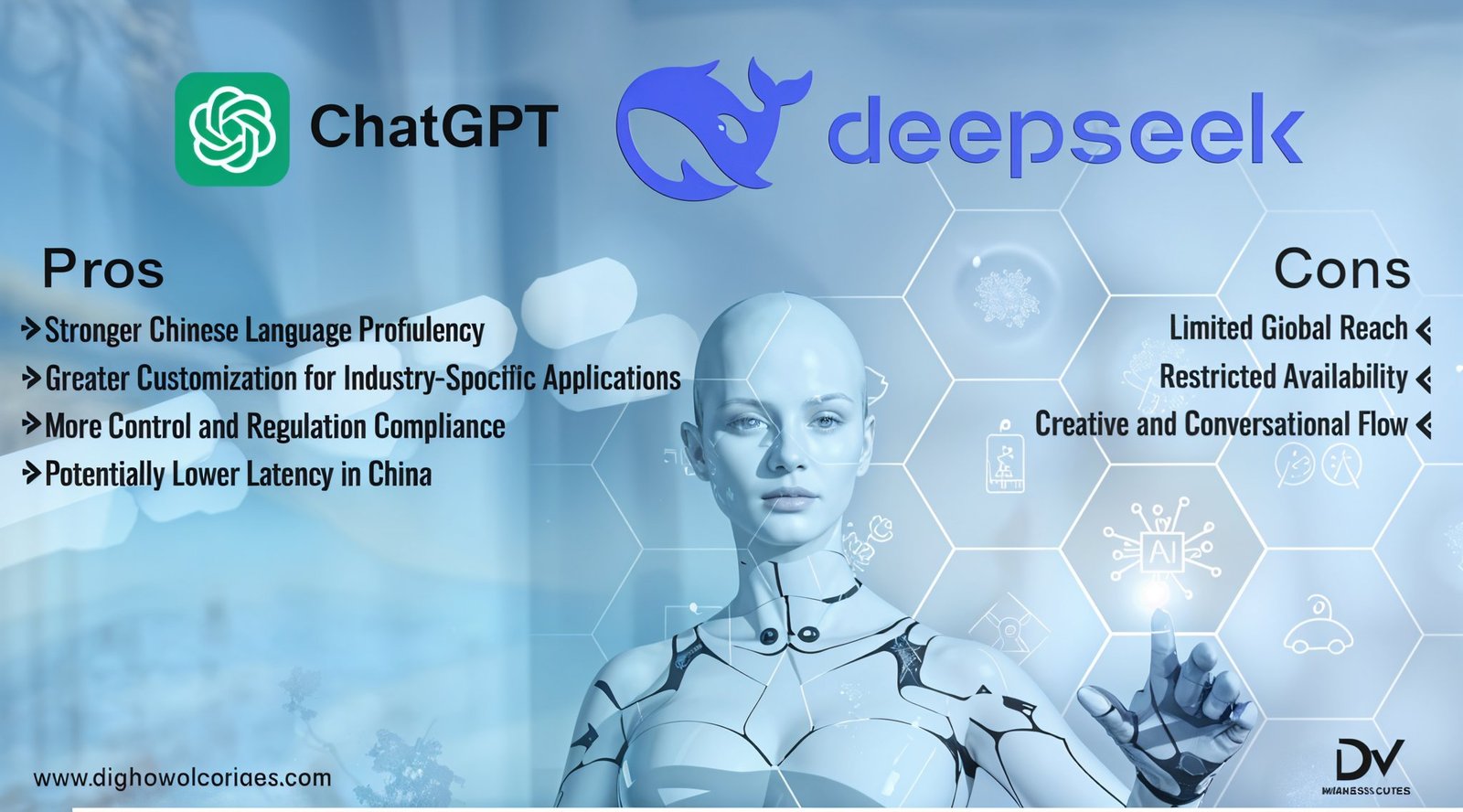The world of artificial intelligence is evolving at an unprecedented pace, with each new model pushing the boundaries of what machines can achieve. Among the latest advancements, DeepSeek-V3, a cutting-edge AI model from China, has emerged as a formidable competitor to OpenAI’s widely popular ChatGPT. But how do these two compare? Which one reigns supreme in the AI landscape? Let’s dive deep into their strengths, weaknesses, and overall impact.
Understanding DeepSeek-V3 and ChatGPT
DeepSeek-V3 AI
DeepSeek-V3 is an advanced AI language model developed in China, designed to cater to both general conversational AI needs and specific applications like coding, research, and professional content creation. It is built with a strong emphasis on multilingual capabilities, especially in Chinese, and integrates advanced natural language processing techniques.
ChatGPT
ChatGPT, developed by OpenAI, is one of the most widely used AI models for natural language processing. Known for its versatility, it excels in creative writing, problem-solving, coding, and customer support. ChatGPT’s continuous improvements and ability to handle complex prompts make it a go-to AI tool worldwide.
Advantages of DeepSeek-V3 AI
1. Stronger Chinese Language Proficiency
-
DeepSeek-V3 has a clear edge in understanding, processing, and generating content in Chinese. It is designed to cater to native Chinese speakers more effectively than most Western AI models, making it a top choice in China and other Mandarin-speaking regions.
2. Greater Customization for Industry-Specific Applications
-
DeepSeek-V3 is reported to have specialized adaptations for industries like finance, healthcare, and law, offering more tailored responses compared to generalist AI models.
3. More Control and Regulation Compliance
-
Given China’s strict AI regulations, DeepSeek-V3 is built to comply with local policies while maintaining high-quality AI performance. This makes it more adaptable to governmental and corporate use cases within China.
4. Potentially Lower Latency in China
-
Since it is hosted and optimized within China, users in the region experience lower response times compared to ChatGPT, which relies on overseas servers.
Disadvantages of DeepSeek-V3 AI
1. Limited Global Reach
-
While DeepSeek-V3 excels in Chinese, it may not be as strong in English or other Western languages. This limits its appeal and effectiveness in non-Chinese-speaking markets.
2. Restricted Availability
-
Due to China’s AI regulations, DeepSeek-V3 might not be freely accessible to users outside China, restricting its growth on a global scale.
3. Creative and Conversational Flow
-
DeepSeek-V3 may struggle with producing highly engaging and fluid conversational outputs in English compared to ChatGPT, which is trained on vast multilingual datasets with a focus on creative and nuanced responses.
Advantages of ChatGPT
1. Superior Multilingual Capabilities
-
ChatGPT supports a vast range of languages with high accuracy, making it a more global-friendly AI. While DeepSeek-V3 is optimized for Chinese, ChatGPT delivers solid performance in English, Spanish, French, and many other languages.
2. Creative and Contextual Intelligence
-
One of ChatGPT’s strongest suits is its ability to generate highly creative content—whether it’s storytelling, poetry, or brainstorming innovative ideas. It understands humor, idioms, and nuanced requests better than many competitors.
3. Wider Adoption and Accessibility
-
ChatGPT is available across multiple platforms and has API integrations that allow businesses worldwide to utilize its capabilities. Unlike DeepSeek-V3, which is limited in access, ChatGPT enjoys an extensive user base.
4. Strong Coding Assistance
-
ChatGPT’s coding capabilities are widely recognized. It can generate, debug, and explain code in various programming languages, making it a valuable tool for developers.
Disadvantages of ChatGPT
1. Regulatory Challenges in Certain Regions
-
Due to data privacy and regulatory concerns, ChatGPT faces restrictions in countries like China. Unlike DeepSeek-V3, which is optimized for compliance within Chinese regulations, ChatGPT can sometimes be inaccessible in highly regulated regions.
2. Potential Bias and Hallucinations
-
Like many AI models, ChatGPT sometimes generates biased or incorrect responses, especially when dealing with niche or highly complex subjects. While OpenAI constantly updates it, occasional AI “hallucinations” remain a challenge.
3. Data Hosting and Privacy Concerns
-
ChatGPT operates on cloud-based servers primarily in the U.S. and Europe, raising concerns about data privacy, particularly for enterprises handling sensitive information.
Who Wins?
There isn’t a clear winner—it all depends on the user’s needs. If you're in China and need an AI optimized for Chinese language tasks, DeepSeek-V3 is the better choice. However, if you require a globally recognized AI with superior multilingual abilities and creative capabilities, ChatGPT is the way to go.
essence, DeepSeek-V3 thrives in its home turf, excelling in regulatory compliance, Chinese language fluency, and industry-specific applications. Meanwhile, ChatGPT dominates in global reach, creativity, coding support, and overall conversational intelligence. The battle between these AI titans is far from over, but one thing is clear—the future of AI is incredibly exciting, and competition will only drive further innovation.



